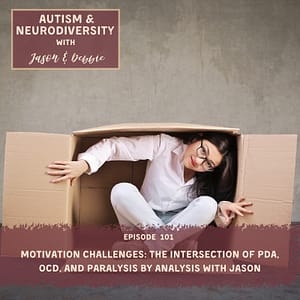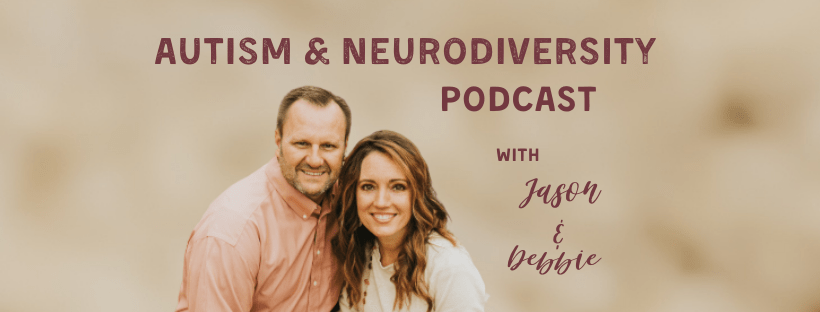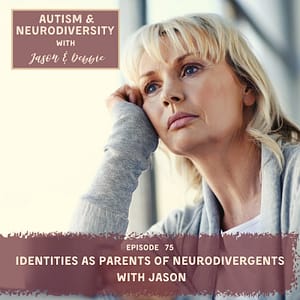[00:03] Jason: Welcome to the Autism and Neurodiversity podcast.
[00:06] Debbie: We’re here to bring you helpful information from leading experts and give you effective tools and support. I’m Jason Grygla, a licensed counselor and founder of Techie for Life, a specialized mentoring program for neurodiverse young adults.
[00:19] Jason: And I’m Debbie Grygla, a certified life coach. And maybe most importantly, we’re also parents to our own atypical Young Adults.
[00:30] Jason:
Hey, it’s good to be back with you. I’m Jason Grygla, and welcome to the Autism and Neurodiversity podcast. It’s been a great day for me. I went mountain biking. I killed myself. I had belly legs when I was done, and it hurt, and I loved every minute of it. So I hope you’ve had a great day. But if you’ve had a rough day, great days will come.
I want to share with you some thoughts today about our identities as parents of those who have neurodivergent brains, issues, disorders, disabilities. Whatever it is that you want to call it. And how. Because there is so much required of supporting someone who is neurodivergent. That oftentimes our identity, our labels for ourselves and how we see ourselves turns into so much of my life is focused on giving and being there for my loved one.
That’s just who I am. And it’s a necessary thing. It’s what any good parent would do. Most of us want to do the best that we can and help out our loved ones. And I think that’s necessary. I think a lot of us get a bad rap that were helicopter parents, that were enmeshed, that we’re not letting them grow on their own. And so we are artificially doing successes for them. And I think that’s probably true sometimes, that we help them do a task or accomplish some feet knowing and hoping that it will build their confidence and spark some progress and some momentum and also help them like themselves. And we still do it for them, and sometimes we do it for us.
I know I really wanted my son to get his Eagles Scout Award, which he did, and it made me really happy. So, you know, whether my son appreciated that or not, I did it for me. And I’m OK with that as well. It can be for us. There’s nothing wrong with that. It doesn’t have to always be about them.
And at some point when we have become enmeshed out of necessity, and so much of our time in our life and our energy and resources have been focused on parenting, helping, mentoring, saving crises, front loading to avoid crises, and cleaning up messes physically, emotionally, financially, sexually, whatever it is that you’re struggling with. And probably all of those, to some extent, it’s who we become.
And there are some problems with that, even if they’re necessary, and you’re maximizing success and you’re doing the best you can, and it’s the best anyone could do, there’s no better way to do it. It’s just going to be messy but the problems and the scars and the cuts and the bruises that come with it include some changes in us that I want to explain that I’ve seen that are pretty common.
The first one is it changes us in a way that makes it so that we aren’t normal parents. We start to develop an advance beyond other parents in many ways because we have to learn quickly what works and what doesn’t down to a very fine razor’s edge of principles that are effective.
And one of the things that I realized for my wife and I is a lot of our friends over the three to five years after we stopped at our boys and they put us through the ringer was that we couldn’t catch with other couples anymore. It didn’t work to have light hearted conversation. It’s almost like we were swimming in deep waters so much that everyone else is overweighting in the waste deep water and not dealing with the rapids or danger. And we had a hard time going back to maybe just shallow chat and everything we talked about was meaty important, big eat. And I couldn’t do the chitty chat stuff anymore.
And so we kind of lost our ability to have friends and be with friends. And when we would talk we would probably overshare about things that work hard for them because they weren’t dealing with anything like that. And so it just alienated us and it changed us and it wasn’t our fault and it wasn’t our friend’s fault but it was one of the sacrifices that I remember and that I think it’s pretty common for many of us as parents. If others get it, they get it and if they don’t get it, they don’t get it. And we all love to find that group that just gets it and we just go. They get it. And we just know we’re like kindred spirits, right the other way.
Some of the other ways that it can change us is it changes how much we are inward focused versus outward focused and we become self sacrificing often to the point of martyrdom and overachievement and unsustainable investment or life guarding or saving our loved one. And we have a harder time just doing stuff for us. One, we have trips that we have to cancel or memories that are damaged or things that filled our cup before that we just don’t have time for or no longer work or no longer available to us because we had to sacrifice and change our life. And I think it’s really important to do those things. We’re not suggesting that it’s healthy to let those go but out of necessity a lot of them go and they leave us.
I know one thing for me that I always kept was my love of collecting rocks and minerals and I just always had it. It was just me. Just for me that was good. But I also let go of a lot of other things. Instead of playing basketball, sometimes I would just need to come home and save my wife. It’s kind of typical of all parents, but even more so with our kids, teenagers and young adults who are more likely to need our time and energy.
Another way that it changes us is our identity and who we just know that we are. And the downside to that is that eventually they do leave or things change and they have come to an equilibrium. Whatever that looks like. Whether it’s in a group home for the rest of their life or whether they finally made it off college with some support or into a support program. Or they’re living down the street with friends and they can’t keep their house clean. But you’re making it.
And it comes to a place where everyday parenting is no longer necessary. Yes, you’re still their mentor. Yes, they still need you in their lives, most likely, but it is different. And when our identity is that we are the person that is the executive functioning for our loved ones and we’re no longer doing that because they’re done with high school and there’s really not much for them to do next. Or they’re in a job and there’s no longer a way for me to help them get and keep jobs because they’re beyond that and they don’t want my help. Maybe they finally made it or maybe they finally hit their plateau and you know that it’s not going to do any good to keep fighting for them to go to school or to get a job or they’re doing it. Or they get into a relationship and move away and don’t let you help them. And they’re crashing and burning, but they’re just like, no, I’m an adult and I’m going to crash and burn because this is what I want. And you watch them and you’re like, it’s hard to watch. And yet they’re doing it on their own.
And a lot of times we don’t know how to let go. We don’t know how to even if we’re so excited about it, even if we’ve said for years, I can’t wait for this to be different. I can’t wait for my break. When it finally comes, maybe it won’t ever end completely, but there will be a shift at some point where you’ve done what you can and this is what life for them looks like when it comes.
We lose our identity and go through an identity crisis and that looks like over enmeshment that continues even though our loved ones say, hey, look off, it’s okay, let them. Let them live their life. They need to do that. And if we haven’t done honest assessment and grieved the losses of our hopes and dreams that will never be reached, if we are still holding on to, if I can just whatever the next step is, then they’ll be successful and I’ll be happy, and that never ends. And they’re 40 or 50, and we still think we’re going to parent them into success. Regardless of whatever it is.
Our identity crises is real, and it will shift. Many of you are thinking and probably have experienced it to some degree where you’re like, well, yeah, I never thought body training or an uretisus, whatever end. And finally, at age 20, it’s over. And how quickly we just got used to the fact that it was over. And instead of celebrating it every day, we’re like, finally it’s over, and we just move on and we don’t get to feel any better because there’s the next crisis.
Well, to change our identities, I have a couple of suggestions for you. One, I think with every person who’s been through a lot of hard things, there are 20 or 50 or 100 others about to go through the same hard things that could use their own mentor in you giving back once you have a break, once you can take a breath, once you get your feet underneath you, if that’s what you need to do. I think helping others is really fulfilling, and that’s one of the reasons Debbie and I are doing this podcast and why we do Techy for Life. We want others to do better than we did, and we want it to be easier and more joyful than we were able to experience.
And I wish we would have had people around us that got it, and there just wasn’t much at the time. There’s more now. Research has come a long way. Groups and Debbie and I are working on a whole range system that maybe if we talked about her, maybe she hasn’t, but we want to share the things that we’ve learned, and that’s coming down the pipeline. They’ll find a way to give back.
Two, go back to your roots. There are some things that you did as a younger, simpler person when life was still a bit of a honeymoon, if it ever was, which I assume that generally it was at some point. And if you learned to love to read and you had to give that up over the years because you just didn’t have the time back and learn to read again. That brings me to the next suggestion that you learn to be still and to be out of fight or flight, out of crises, out of go, go, go mode. And that’s actually really hard. When our brains have been trained to be in survival mode, we kind of always assume for the next shoe to drop, the next crisis to hit the next problem, and they might. But there’s also a time when you realize, yeah, it’s going to hit, and it’s not a crisis because it’s just the next thing. There comes a point where there’s no such thing as a crisis anymore. It’s just the next thing, and it no longer really is going to affect my peace of mind, my happiness. Although I’ve gotten to the point where I’m going to let it affect the life of my adult neurodivergent, young adults who want to make their own decisions, and there’s nothing I can do about it. So find peace and learn to be still. Learn to slow down, learn to meditate, learn to pray, learn to do yoga. Take up your activities, your hobbies and your interests again. You might not like them anymore, and that’s okay. Then find a new one and find your people. It’s okay to enjoy and connect.
But what fascinates me about us as humans is that my wife and I sometimes are just so excited to go on a date and get some time alone and get away from our kids. And then you know what we do for our whole day at dinner, right? We just talk about our kids and their problems and their successes, and it’s still all about them.
And every parent goes through this empty nesting. This isn’t different than any parent. It’s just that maybe we’ve been a little more enmeshed and a little more connected to our loved ones. And so the identity in that role is way stronger than it typically would be. So we have to be intentional that our identity is going to change. We are going to go through a bit of a crisis. I know some parents, they can’t let go because they don’t know how. And if they let go for even a second, the ball drops even harder, the next shoe drops and crises hits even more. So they’re in survival panic mode. And I want you to be intentional about letting that go.
There comes a point where there’s not much more you can do to help them live their best life. Another suggestion would be to rekindle your romantic life, whether you’re married, single, living together, I don’t care what it is. Start again. Date, flirt. Bring some fire into the bedroom, bring some fire into your activities.
Go on trips, whether they’re hiking and camping for free or traveling Europe, I don’t care. It doesn’t matter. It’s not about spending money. It’s about how do I rekindle my relationship and renew it? Because you’re going to have to reestablish and regrow your relationship as new people, different people. You get the added benefit of a lot of depth and a lot of empathy and a lot of refinement, having been through what you’ve been through.
And at the same time, you might be charred and singed at the edges, edgy, a little bit bitter, hardened, jaded. If those are there, now’s the time to get some help. See a counselor, read a book, do yoga, go shopping and buy things that you could never have in your home before because they get broken or stolen.
Be intentional about how to find the new you and be excited about it, because it can be really awesome. So there’s a lot of things that older. More mature couples and experience that young. Ignorant. Naive couples. Just there’s a lot of depth to your relationship that can actually cement you together. And it might be a bit of a trauma bond. And that’s okay because you’re still bonded. And I don’t want you to be waiting for the next crisis to hit any second the rest of your life. It’s time to move on from that, but it’s going to take some time. You’re going to have to work at it, and your brain can only change so quickly.
So deciding to let go of the stress and the worry, you might have to do that a thousand times before you realize, yes, I haven’t really stressed about it for a while, but it took about a year or a month or ten years. I don’t know. Everyone’s different. Just know that that’s coming and that it’s expected and that it’s okay and that it no longer helps to stay in an intense role as a mentor, parent, coach, teacher, whatever it is that you’ve done forever, take a break, enjoy your life. You deserve it and move on, because your identity is not I’m the parent, or caregiver of someone who is neurodivergent forever in the rest of your life. There’s got to be more to life, and I’m excited for you to find it again.
So thanks for listening today. I hope that was helpful. I’d love to hear from some of you what you did to transition back into your life instead of your life being enmeshed with something else. I’d love to hear some suggestions that we could probably put on our website or doing another podcast about what works. I know we have some great interviews that we’ve just presented to you or coming up, so I’m excited for what we’re sharing with you. Thanks for joining me, and we will talk to you another time.
[13:07] Debbie: Thanks for joining us on this episode of Autism and Neurodiversity with Jason and Debbie. If you want to learn more about our work, come visit us at jasondebbie.com.




